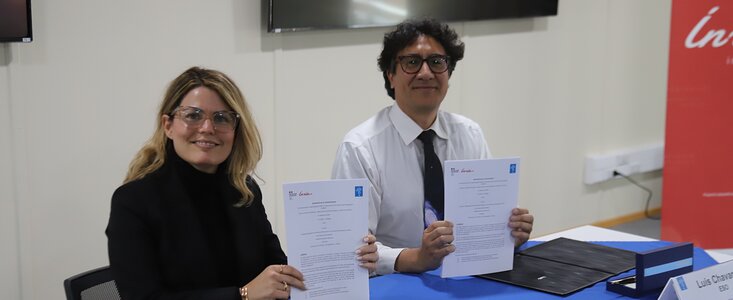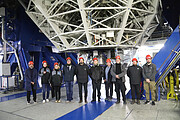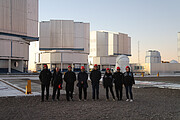Anuncio
ESO e Inria Chile firman acuerdo para desarrollar la operación conjunta del VLT y ELT, dos de los telescopios más grandes del mundo
22 de Mayo de 2024
El 16 de mayo, ESO y el Instituto francés de investigación en ciencias digitales en Chile (Inria Chile) firmaron un Memorándum de Entendimiento para facilitar la colaboración entre ambas instituciones en proyectos de transformación digital en el Observatorio Paranal de ESO.
El Memorándum fue firmado por Luis Chavarría, representante de ESO en Chile y Nayat Sánchez-Pi, directora de Inria Chile, en el mismo Observatorio Paranal junto a una comitiva del Instituto, en la que también participó Gonzalo Arenas, jefe de Relaciones Internacionales del Ministerio de Ciencia, Tecnología, Conocimiento e Innovación de Chile, en representación de dicha cartera. Juntos recorrieron diferentes telescopios y observaron el trabajo de la sala de control del observatorio.
ESO opera en el Observatorio Paranal el Very Large Telescope (VLT de ESO), el telescopio de luz visible más avanzado del mundo, y a finales de esta década, pondrá en operación el Extremely Large Telescope (ELT de ESO), el telescopio visible e infrarrojo cercano más grande del orbe, actualmente en construcción en cerro Armazones. La integración del ELT a las operaciones del Observatorio Paranal plantea grandes retos y demanda mejoras constantes.
"El ELT de ESO será el telescopio óptico más grande del mundo, lo que representará un desafío considerable. Nuestro objetivo es integrarlo plenamente en las operaciones diarias de Paranal. Este acuerdo de colaboración nos permitirá explorar la mejor manera de lograrlo y aprovechar la experiencia de Inria en grandes observatorios, como ALMA, del cual también somos parte," dijo Luis Chavarría, luego de la firma del convenio.
"Esta alianza con ESO para las operaciones del ELT y el VLT nos llena de entusiasmo y orgullo, ya que nos permitirá impulsar la frontera del conocimiento científico y tecnológico en ciencias digitales en un sector clave para Chile como es la Astronomía", señaló la directora de Inria Chile, Nayat Sánchez-Pi. "Nuestra vasta experiencia en ciencias digitales, inteligencia artificial y análisis de datos, sumada a nuestra trayectoria de trabajo con observatorios astronómicos, será clave para el desarrollo de soluciones digitales innovadoras que optimizarán las operaciones del Observatorio Paranal.”, agregó.
"Estamos muy emocionados de asociarnos con Inria para desarrollar el modelo futuro de operaciones para nuestro Observatorio Paranal con el VLT y el ELT. La vasta experiencia de Inria en esta área es crucial para nuestros planes ambiciosos de operar el observatorio terrestre más grande de manera eficiente, efectiva y sostenible," dijo Andreas Kaufer, director de operaciones de ESO, que estuvo telemáticamente en la ceremonia.
Inria Chile, es el primer y único centro del Instituto francés de investigación en ciencias y tecnologías digitales ubicado fuera de Francia, institución pública que, entre otras cosas, coordina el componente de investigación de la Estrategia Nacional en Inteligencia Artificial de Francia. El instituto, adicionalmente tiene una larga experiencia de trabajo junto a observatorios astronómicos ubicados en Chile, en particular con el Observatorio ALMA, donde ESO, en conjunto con sus socios internacionales, opera el radiotelescopio más grande del mundo. Esta experiencia le ha valido un reconocimiento significativo dentro de la comunidad científica y tecnológica, facilitando su colaboración desde su expertise en ciencias y tecnologías digitales con diversas instituciones dedicadas a la astronomía para potenciar la capacidad e infraestructura de telescopios avanzados mediante técnicas de inteligencia artificial, interacción humano-computador e ingeniería de software.
Este marco de entendimiento entre ESO e Inria Chile representa un importante paso en colaboración científica y tecnológica que involucra a Francia, Chile y ESO. Esta alianza considera cuatro líneas de trabajo principales:
- la creación de un sistema integrado de control para los telescopios VLT y ELT;
- el análisis de grandes volúmenes de datos para realizar diagnósticos y mantenimiento predictivo;
- la creación de una herramienta de reporte, visualización y análisis de puntos claves durante las operaciones de los telescopios;
- la creación de una infraestructura de datos, modelos y experimentación, a través del desarrollo de una plataforma que albergará la información generada por los telescopios, así como modelos de inteligencia artificial y herramientas de experimentación.
Enlaces
Contactos
Francisco Rodríguez I.
ESO Media Relations Officer
Teléfono: +56 2 2463 3151
Correo electrónico: frrodrig@eso.org
Costanza Cristino
Prensa Inria Chile
Teléfono: +56 9 9289 5205
Correo electrónico: coni.cristino@parla.cl
Sobre el anuncio
| Identificador: | annlocal24004-es-cl |
Our use of Cookies
We use cookies that are essential for accessing our websites and using our services. We also use cookies to analyse, measure and improve our websites’ performance, to enable content sharing via social media and to display media content hosted on third-party platforms.
ESO Cookies Policy
The European Organisation for Astronomical Research in the Southern Hemisphere (ESO) is the pre-eminent intergovernmental science and technology organisation in astronomy. It carries out an ambitious programme focused on the design, construction and operation of powerful ground-based observing facilities for astronomy.
This Cookies Policy is intended to provide clarity by outlining the cookies used on the ESO public websites, their functions, the options you have for controlling them, and the ways you can contact us for additional details.
What are cookies?
Cookies are small pieces of data stored on your device by websites you visit. They serve various purposes, such as remembering login credentials and preferences and enhance your browsing experience.
Categories of cookies we use
Essential cookies (always active): These cookies are strictly necessary for the proper functioning of our website. Without these cookies, the website cannot operate correctly, and certain services, such as logging in or accessing secure areas, may not be available; because they are essential for the website’s operation, they cannot be disabled.
Functional Cookies: These cookies enhance your browsing experience by enabling additional features and personalization, such as remembering your preferences and settings. While not strictly necessary for the website to function, they improve usability and convenience; these cookies are only placed if you provide your consent.
Analytics cookies: These cookies collect information about how visitors interact with our website, such as which pages are visited most often and how users navigate the site. This data helps us improve website performance, optimize content, and enhance the user experience; these cookies are only placed if you provide your consent. We use the following analytics cookies.
Matomo Cookies:
This website uses Matomo (formerly Piwik), an open source software which enables the statistical analysis of website visits. Matomo uses cookies (text files) which are saved on your computer and which allow us to analyze how you use our website. The website user information generated by the cookies will only be saved on the servers of our IT Department. We use this information to analyze www.eso.org visits and to prepare reports on website activities. These data will not be disclosed to third parties.
On behalf of ESO, Matomo will use this information for the purpose of evaluating your use of the website, compiling reports on website activity and providing other services relating to website activity and internet usage.
Matomo cookies settings:
Additional Third-party cookies on ESO websites: some of our pages display content from external providers, e.g. YouTube.
Such third-party services are outside of ESO control and may, at any time, change their terms of service, use of cookies, etc.
YouTube: Some videos on the ESO website are embedded from ESO’s official YouTube channel. We have enabled YouTube’s privacy-enhanced mode, meaning that no cookies are set unless the user actively clicks on the video to play it. Additionally, in this mode, YouTube does not store any personally identifiable cookie data for embedded video playbacks. For more details, please refer to YouTube’s embedding videos information page.
Cookies can also be classified based on the following elements.
Regarding the domain, there are:
- First-party cookies, set by the website you are currently visiting. They are stored by the same domain that you are browsing and are used to enhance your experience on that site;
- Third-party cookies, set by a domain other than the one you are currently visiting.
As for their duration, cookies can be:
- Browser-session cookies, which are deleted when the user closes the browser;
- Stored cookies, which stay on the user's device for a predetermined period of time.
How to manage cookies
Cookie settings: You can modify your cookie choices for the ESO webpages at any time by clicking on the link Cookie settings at the bottom of any page.
In your browser: If you wish to delete cookies or instruct your browser to delete or block cookies by default, please visit the help pages of your browser:
Please be aware that if you delete or decline cookies, certain functionalities of our website may be not be available and your browsing experience may be affected.
You can set most browsers to prevent any cookies being placed on your device, but you may then have to manually adjust some preferences every time you visit a site/page. And some services and functionalities may not work properly at all (e.g. profile logging-in, shop check out).
Updates to the ESO Cookies Policy
The ESO Cookies Policy may be subject to future updates, which will be made available on this page.
Additional information
For any queries related to cookies, please contact: pdprATesoDOTorg.
As ESO public webpages are managed by our Department of Communication, your questions will be dealt with the support of the said Department.



